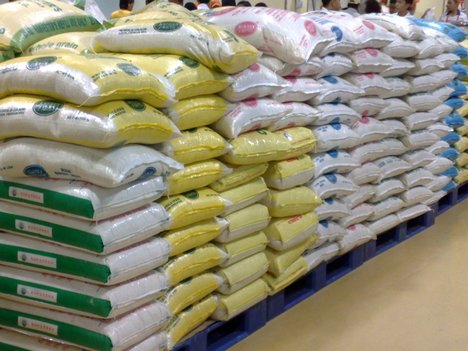
Large-scale Rice Millers Groan under Paddy Scarcity, by Salisu Na’inna Dambatta
Nigeria’s drive toward self-sufficiency in rice production as part of a multifaceted programme to deepen our national food security as enunciated by the administation led by President Muhammadu Buhari seem to be under threat as large scale rice millers in the country are performing by far below their installed capacity because their locally-sourced raw material, paddy rice, is not available in the desired quantity to meet their demand. This scarcity is caused by a combination of factors.
One of the key factors is the gradual distortion of the much-praised Rice Anchor Borrowers Programme, through which requisite inputs for rice production are extended to farmers. The inputs and cash component of the loan package for accelerated and expanded rice production is hinged on a funding scheme laudably introduced by the Central Bank of Nigeria (CBN).
The programme, which is now called RIFAN-CBN Anchor Borrowers Programme, is facing default in the recovery of loans, leading to court cases in some states. This arose largely because many people who could not differentiate between the leaves of rice and wheat were somehow allegedly able to access it, taking it for a welfare largesse from the Federal Government through the CBN. This is a major distortion.
Reports indicate that at least 300 beneficiaries of the loan who failed to pay back were prosecuted in Kano state; in the Daura area of Katsina state 113 beneciaries have failed to pay and were prosecuted to recover the loans.
It was widely reported in the national media that the Chairman of Rice Farmers Asociation of Nigeria (RIFAN), in Kebbi State said the association has sued 70,000 rice farmers to court for failure to repay the N17 billion loan given to them in 2015. And the Chairman of Jigawa state RIFAN disclosed that he had so far recouped N200,000 only of the N1.8 billion loan from 18,000 rice farmer beneficiaries in the state.
The sad truth is that the more borrowers default, the less will be the number of rice farmers, implying less paddy rice for uptake by millers, who borrowed billions of Naira to become rice processors and in the process contribute in the country’s desire to achieve self-sufficiency in rice production.
The CBN’s decision to play the role of a Rice Marketing Board by mopping up paddy rice from farmers to erect rice pyramids for optics and at the same time discouraging millers from buying paddy at the market-determined price of N170, 000 per metric ton, is another favor as it led to a scarcity of paddy,. Additionally, the CBN controlling the price by selling to dealers (at N160, 000 per metric ton) and allocating less than 15 truckloads to each miller, regardless of installed capacity, is another reason why millers can not get enough paddy.
Some of the millers who can no longer meet the demand for parboiled rice from their customers feel that the CBN ought not to play the role of a paddy rice marketing board, ostensibly for the purpose of building paddy pyramid to impress watchers of its activities. Market forces should have been allowed to determine the prices for the different grades of the commodity. One of the unintended results of the CBN intervention is that the best grade of paddy, which commands premium price, and the worst, are sold at the same price. This is detrimental to the farmers whose crop should attract better price as a reward for producing the best.
Additionally, miller’s are finding it difficult to buy paddy in the open market because they are now competing with CBN-sponsored buyers. More than 80 per cent of the millers can no longer buy paddy rice to keep their mills running for more than two months, allegedly because of the CBN-sponsored buyers in the market. Based on their observations and comments, rice millers in the country would be happy to see the CBN withdraw from the paddy market. This, they believe, will lead to stable, transparent and a market that is not distorted.
The governor of the CBN, Dr. Godwin Emefiele attributed the intervention in the paddy market to a presidential approval for the resuscitation of the Nigeria Commodity Exchange (NCX) and the commitment of N50 billion by the CBN and other stakeholders. This made the rice pyramids possible. He said the intervention would improve post-harvest management, guarantee good pricing for farmers and eliminate middle men. Most of the rice millers do not see the intervention as good or beneficial to the drive to grow paddy at home , process it locally and sell it at affordable price to consumers. The target of N6,000 per 25 kilogrammmes of parboiled rice is off the radar so long there is no sufficient paddy for milling in the country.
However, regardless of the challenges they faced, particularly the shortage of paddy to process, large rice millers remain loyal and committed to the national goal of achieving rice sufficiency through local production and processing. And it is to their credit that no rice miller who accessed facilities brokered by the CBN has defaulted in paying back the loans through the relevant intermediary bank. This is examplary. And commendable.
One other way via which they want to do more is that, the rice millers have expressed a strong willingness to accept at least 20 hectres each from the Nigerian Agriculcural Land Development Authority to solely devote it to paddy rice production. This idea can support their desire to opt for the backward integration model to guarantee a minimum of paddy supply to their mills thereby enhance their individual and industry-wide capacity utilisation..
Overall, despite the challenges of defaulting by some beneficiaries to pay back the money lent to them, the Central Bank of Nigeria said that number of the RIFAN-CBN ABP have increased from an inaugural 75,000 beneficiaries in 26 states to 275,000 beneficiaries who are cultivating 220,000 hectares of rice.
Salisu Na’inna Dambatta is a retired Federal Director of Information.
